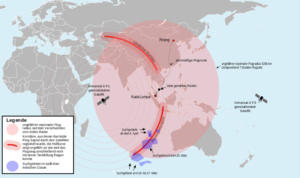This article was written by Eran Tsur, VP Marketing at QMarkets.
We’ve partnered with Qmarkets to provide clients with a well-organized process that will allow for improved change management, targeted leadership, real-time employee engagement, and collective goal-sharing. Leveraging their suite of collective intelligence solutions, clients of our Project WOW program will be able to virtually tackle a variety of business challenges, including innovation management, process improvement, new product development, talent identification and incubation, and hackathons.
________

The acclaimed educational reformer John Dewey once said, “every great advance in science has issued from a new audacity of imagination”. Today, this audacity is reflected in the rising influence of citizen science – that is, the collaboration of volunteer non-scientists with professional scientists in collecting data and analyzing it to resolve real-world issues.
The citizen science movement is growing rapidly on a global scale, synergizing professionals from diverse scientific fields and volunteers from around the world. As the general public’s interest in science continues to increase, professional scientists and researchers develop innovative tools to effectively engage crowds.
In the current disruptive business landscape, where innovation is more important than ever, organizations need to look to alternative sources to gather ideas and solutions in order to remain successful. As such, businesses are beginning to recognize the potential citizen science has for supporting open innovation initiatives. After all, citizen science and open innovation methodologies share numerous similarities. Both have the potential to gather powerful insights and break the insular corporate mindset that often stifles growth.
Even large-scale corporations – including Coca-Cola, Nasa, and Google – are beginning to adopt the citizen science approach. Such companies have implemented online challenges that incentivise the general population to apply their scientific acumen (even if not formally attained) to develop innovative solutions and ideas. The result is a more open and democratized approach to knowledge gathering, informed by the scientific process and honed to address specific issues within a given timeframe.
Crowdsourcing company HeroX provides a platform for citizen science projects in conjunction with the Nasa Tournaments Lab. The platform makes it easier for individuals with no scientific background to contribute data to regularly updated NASA projects.
________
This article will explore why major companies and scientific organizations are increasingly seeking the contributions of citizen scientists. We’ll cover why the citizen science approach is useful for breaking down restrictive corporate silos, saving money, and seeking out untapped reservoirs of genius. Throughout, we’ll touch on how open innovation management software – such as that offered by Qmarkets – can help leverage the collective intelligence of citizen scientists to drive business results.
But first, let’s take a brief look at how citizen science has developed over the years.
The Evolution of Citizen Science
Although some in the scientific community have raised concerns about the validity and/or applicability of crowdsourced discoveries, grassroots citizen science has been successfully practiced for over a century. In 1890, the American National Weather Service launched the Cooperative Observer Program – a still ongoing project that supports long-term climate studies by reporting national meteorological changes in real time, as recorded by volunteers.
“Businesses are beginning to recognize the potential citizen science has when it comes to gathering powerful insights and breaking the insular corporate mindset that often stifles innovation.”
Today, the digitalization of information has created many new opportunities not just for scientists. Companies, individuals, NGOs and other groups are now able to collaborate with the greater public, thanks to this revolutionary technology. Real-time technologies, artificial intelligence, and big data capabilities exponentiate the amount of information that can be collected for both short and long-term projects. The speed at which this information can be processed can also be dramatically increased via digitalization.
Citizen science and crowdsourcing are being increasingly recognized as invaluable tools for solving large-scale problems that transcend borders. The Crowdsourcing Week article A Thousand Eyes Are Better Than Two by Shay Hershkovitz details how international naval and air force authorities have implemented crowd-based initiatives in their search for the missing MH 370 airliner. By harnessing the power of decentralized crowds (and recognizing where data science and human-based analysis intersect), searchers are able to gain a far broader set of data than would be possible by only employing dedicated professionals.

The potential of open source and citizen science has grown rapidly over the years, and now encompass major international initiatives- including the search for the missing MH370 airliner.
________
As we will see, breaking down restrictions and opening research to non-professionals can prove invaluable for driving crucial data.
Click here to continue reading and discover how organizations can unlock human potential with the power of Citizen Science and Gamification.
